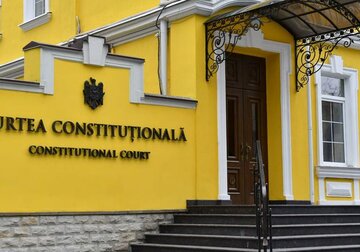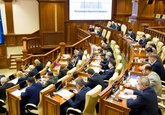
The Constitutional Court recognized as constitutional the decree of the President of Moldova, Maia Sandu, dated March 16, on the appointment of Igor Grosu as a candidate for the post of Prime Minister.
This decision was made by the Constitutional Court on Monday after considering the petition of the deputies from the Socialist Party of RM, who asked to declare the above-mentioned decree of the head of state unconstitutional. The socialist deputies believed that when nominating Igor Grosu, President Maia Sandu violated certain constitutional norms, since none of the participants in the consultations of parliamentary factions and groups nominated Igor Grosu for the post of prime minister, and they could propose a new candidate for the post of head of government after Mariana Durlesteanu's refusal to be a candidate from the parliamentary majority formed to support her. The Socialist Party of RM believes that Maia Sandu imitated consultations with parliamentary factions on the nomination of a candidate for the post of Prime Minister, initially knowing about Mariana Durlesteanu's decision to withdraw her candidacy for the post of Prime Minister, which she announced to the general public on the social network only during the statements of the Socialist Party of RM deputies and their leader after consultations with the president on March 16, however, the official refusal of Mariana Durlesteanu reached parliament only on March 17. Socialist deputies believe that Maia Sandu was in a hurry to nominate Igor Grosu as a candidate for the post of prime minister, while she did not take into account the requirements of the Constitution and the decisions of the Constitutional Court, did not show sufficient openness and desire to find a candidate who would receive parliamentary support. In their opinion, by promoting Igor Grosu, Maia Sandu is putting political pressure on parliament. At the same time, Olesea Stamate, the presidential adviser on legal issues, noted that the head of state was guided exclusively by the Constitution and nominated Igor Grosu as a candidate for the post of prime minister after Mariana Durlesteanu's refusal, and thus the parliamentary majority, formed earlier with the sole purpose of supporting her candidacy for the post of prime minister. According to her, the president had not only the right, but also the obligation, since by its previous decision of August 6, 2020, the Constitutional Court decided that if a formalized absolute parliamentary majority was not formed, then the president was obliged, after consultations with parliamentary factions, to nominate a candidate for the post of prime minister, even if parliamentary factions do not agree with this proposal. Olesea Stamate also drew attention to the fact that the last word in the issue of approving or not approving the new government belongs to the parliament.// 22.03.2021 — InfoMarket.







